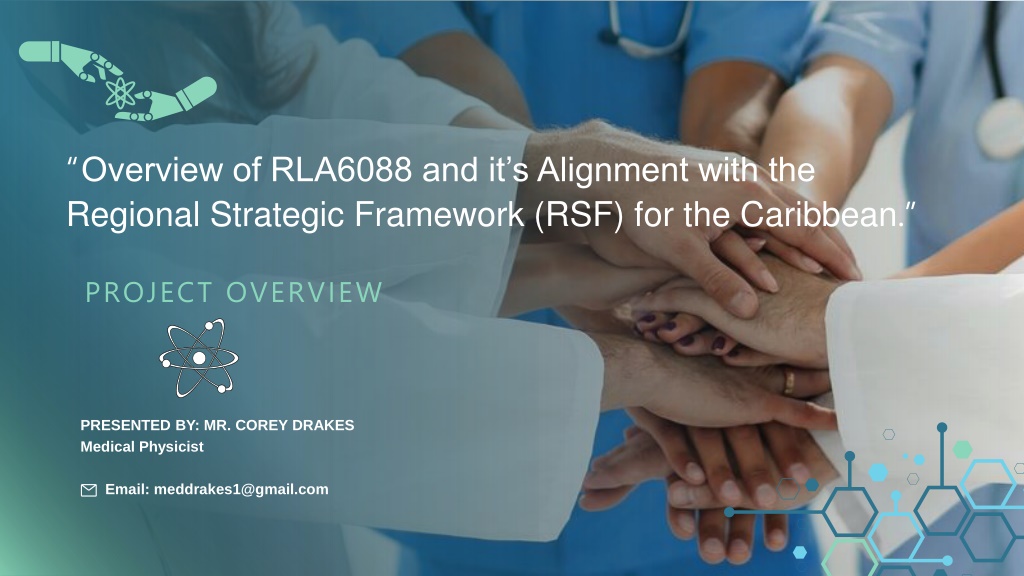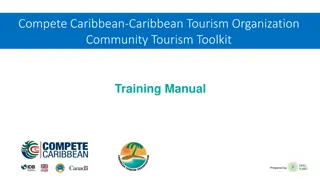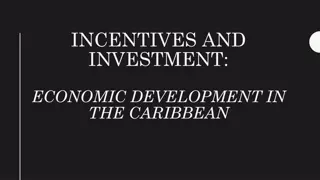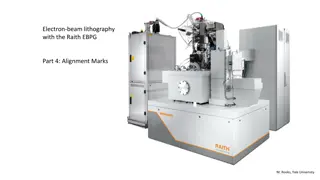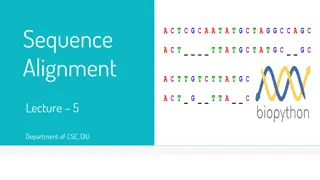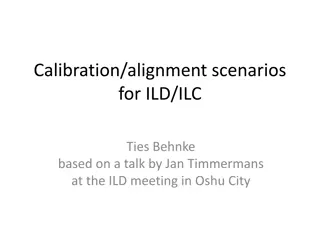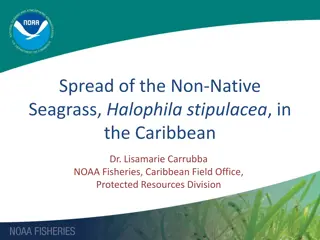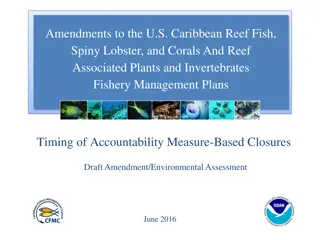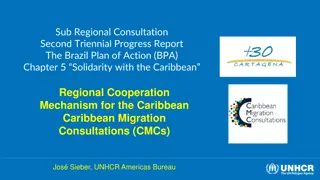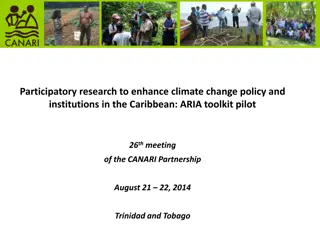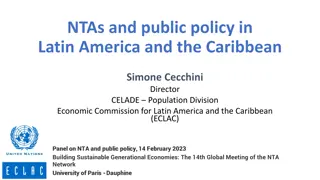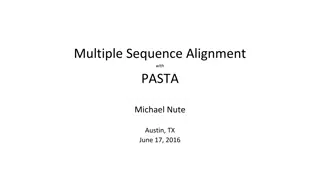Enhancing Healthcare in the Caribbean through RLA6088 Alignment
Overview of RLA6088's alignment with the Regional Strategic Framework (RSF) for the Caribbean presented by Mr. Corey Drakes, focusing on addressing the pressing human health needs and problems in the region. The RSF identifies key areas for technical cooperation with IAEA-CARICOM Member States, emphasizing the use of nuclear technologies in agriculture, radiation safety, human health, environment, and energy. Specific challenges include lack of access to specialized care in radiation medicine, cancer as a leading cause of death, quality variations in radiation services, insufficient human resources, inadequate equipment management, infectious diseases, and childhood obesity. The RSF outlines outcomes aimed at improving healthcare access, reducing cancer mortality, standardizing quality in radiation medicine, ensuring competent human resources, and enhancing equipment management.
Uploaded on Jul 01, 2024 | 0 Views
Download Presentation

Please find below an Image/Link to download the presentation.
The content on the website is provided AS IS for your information and personal use only. It may not be sold, licensed, or shared on other websites without obtaining consent from the author. Download presentation by click this link. If you encounter any issues during the download, it is possible that the publisher has removed the file from their server.
E N D
Presentation Transcript
Overview of RLA6088 and its Alignment with the Regional Strategic Framework (RSF) for the Caribbean. PROJECT OVERVIEW PRESENTED BY: MR. COREY DRAKES Medical Physicist Email: meddrakes1@gmail.com
Regional Strategic Framework for Technical Cooperation with IAEA-CARICOM Member States 2020-2026 13 IAEA-CARICOM Member States Identifies the region's most pressing problems/needs that can be addressed using nuclear technologies, classified into six thematic areas: Agriculture and food production Radiation safety Radiation technologies Human health Environment Energy
(Human Health) Needs/Problems
RSF (Human Health)-Needs/Problems H1. Lack of availability and access to tertiary and specialized care services in radiation medicine H2. Cancer is a leading cause of death H3. Differing levels and standards of quality and safety in the delivery of radiation medicine services H4. Insufficient human resources in radiology, nuclear medicine and radiotherapy to meet the growing needs arising from the establishment of new centres
RSF (Human Health)-Needs/Problems H5. Inadequate systems for life cycle management of medical equipment for radiation medicine (planning, procurement, incorporation, maintenance and disposal) H6. Emerging and re-emerging infectious diseases, including increasing severity and frequency of mosquito-borne disease outbreak (e.g. dengue, Zika and chikungunya) H7. Growing childhood obesity in the region and its link to the incidence of non-communicable diseases
RSF (Human Health) Outcomes
RSF (Human Health)-Outcomes Outcome 1 (Improved Access to Healthcare) Outcome 2 (Reduction In Cancer Mortality and Morbidity) Outcome 3 (Standardization of Quality and Safety in Radiation Medicine) Outcome 4 (Adequate Human Resources Trained and Competent in Radiation Medicine) Outcome 5 (Improved Equipment Uptime-Life Cycle Management Plans
RSF (Human Health) Indicators
RSF (Human Health)-Indicators Outcome 1 (Improved Access to Healthcare) Indicator Number of MSs with referral processes for patients from other countries in the region. Number of MSs participating in regional collaborative diagnostic/treatment mechanisms, e.g. telemedicine, consultations, tumour boards Outcome 2 (Reduction In Cancer Mortality and Morbidity) Indicator Number of MSs that have developed/revised robust and funded NCCPs, including the radiation medicine component. Regional strategy and framework of action on cancer control including the radiation medicine component developed
RSF (Human Health)-Indicators Outcome 3 (Standardization of Quality and Safety in Radiation Medicine) Indicator Number of institutions with human resources trained and competent in quality and safety protocols in radiation medicine, including radiopharmacy Outcome 4 (Adequate Human Resources Trained and Competent in Radiation Medicine) Indicator Number of trained radiation medicine professionals available and working in the region.
RSF (Human Health)-Indicators Outcome 5 (Improved Equipment Uptime-Life Cycle Management Plans Indicator Number of MSs with life cycle management plan for medical equipment for radiation medicine including facilities and equipment for production of radiopharmaceutical products. Number of MSs that have institutions with trained personnel in the maintenance and disposal of medical equipment for radiation medicine . .
Strengthening Radiation Medicine Services through Human Capacity Development, Improved Quality Assurance, Quality Control and Networking. Project Overview
Overview of RLA6088 Project Title Strengthening Radiation Medicine Services in the Caribbean through Human Capacity Development, Improved Quality Assurance, Quality Control and Networking Project Duration January 2022- December 2025
Project Overview Overall Objective To improve the management of patients in nuclear medicine, diagnostic radiology and radiotherapy through the provision of high-quality diagnostic and therapeutic services. Outcome Improved quality assurance and dosimetry programmes in radiation medicine at the national level toward establishing quality management systems across the region. Outputs 1. Standardised guidelines for education and training of medical physicists 2. Standardised and improved quality assurance programme for radiation medicine 3. Trained medical professionals in radiation medicine available 4. Online platform for health professionals working in radiation medicine
Overview of RLA6088 Project Background: Quality Assurance is essential to enhancing the quality and safety of patient care for accurate diagnosis and improved treatment outcomes. Across the region, there are shortfalls in radiation medicine requiring urgent attention. These deficiencies are mainly due to a low number of clinically qualified medical physicists, limited regulatory infrastructure for safe and high quality radiation medicine, the absence of comprehensive Quality Assurance programmes and structured clinical training linked to the academic education in medical physics, certification schemes and continuing education development programmes.
Overview of RLA6088 Project Objectives: To improve the quality of healthcare through: Implementation of Standardised Quality Assurance programmes Increasing the capacity of clinically trained health professionals Creation of dose assessments and management of high dose procedures Developing online and software tools to promote efficient and effective collaboration amongst healthcare professionals Implementing sustainable continuing professional development programmes.
Overview of RLA6088 Project Objectives: To build on the strengthened competencies achieved under RLA6081. Adopted a strategic approach to: Optimize patient dose protocols in Radiology and Nuclear Medicine Accelerate the employment of strict QA/QC protocols and quality manuals in all areas of radiation medicine Establish institutional DRLs in Radiology and Nuclear Medicine Establish a radioactive waste management system for Nuclear Medicine Ensure optimal cancer management and treatment in Radiotherapy and radionuclide therapy through an improved quality management system.
Project Implementation 2022-2023 Expert Missions & Assessments Expert Mission to Evaluate UWI Capacity to Start a Master s Programme in Clinical Medical Physics, May 2023, Kingston, Jamaica Expert Mission with three experts to support the Conference Quality Assurance in Radiation Medicine for Sustainable Health Care , November 2023, Kingston, Jamaica
Project Implementation 2022-2023 Training Courses & Sponsored Participation RTC on Quality Management in Radiotherapy, November 2022, Chicago ,USA - 15 participants from BAR, JAM, TRI Sponsored Participation in Conference on Quality Assurance in Radiation Medicine for Sustainable Health Care, November 2023, Kingston, Jamaica - 3 experts and 33 participants from ANT, BAR, BZE, DOM, GRE, GUY, JAM, SLU, SVG, TRI
Project Implementation 2022-2023 Procurement Procurement of phantom materials for remote and automated quality control for digital X-ray and Mammography Units.
Project Implementation in 2024 Training Courses & Sponsored Participation Regional Training Course on Breast Imaging proposed for MD Anderson (Texas) in May 2024 Regional Training Course to Conduct Hands on Quality Control for Imaging Modalities in Diagnostic Radiology (Including remote and automated QC component). Procurement Basic diagnostic radiology QC equipment for all MS except (ANT, BAR, GUY, JAM, TRI) which already received Procurement of Educational Treatment Planning System to support the clinical component of the Medical Physics programme at the University of the West Indies in Jamaica
Alignment of RLA6088 and RSF Process Map: RSF-Human Health Problems/Needs RLA6081- Goals/Objectives RLA6088- Goals/Objectives RSF-Human Health Outcomes
